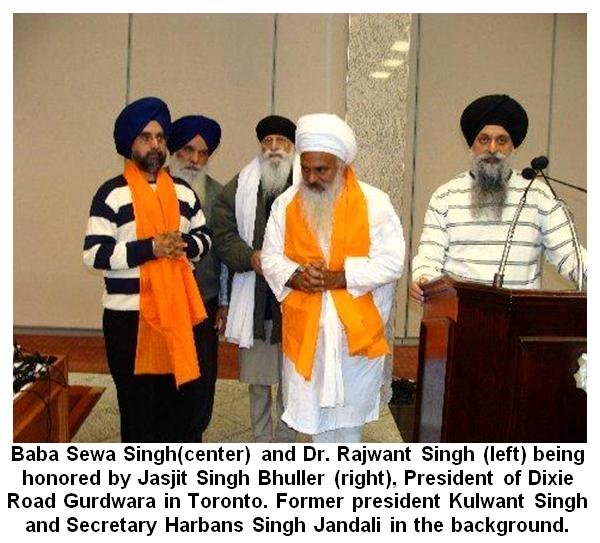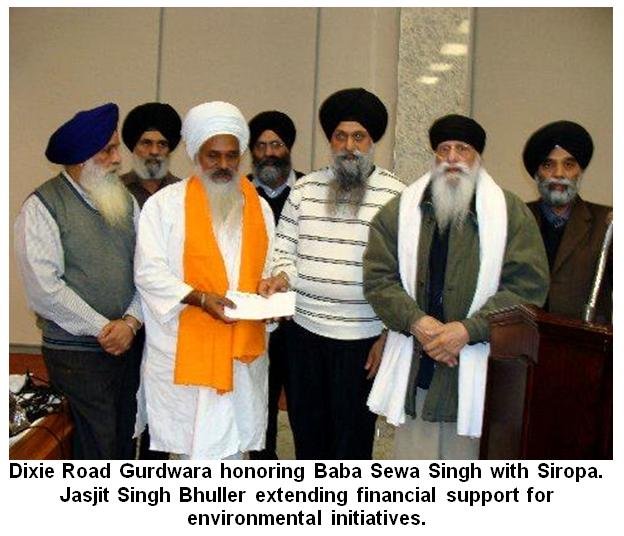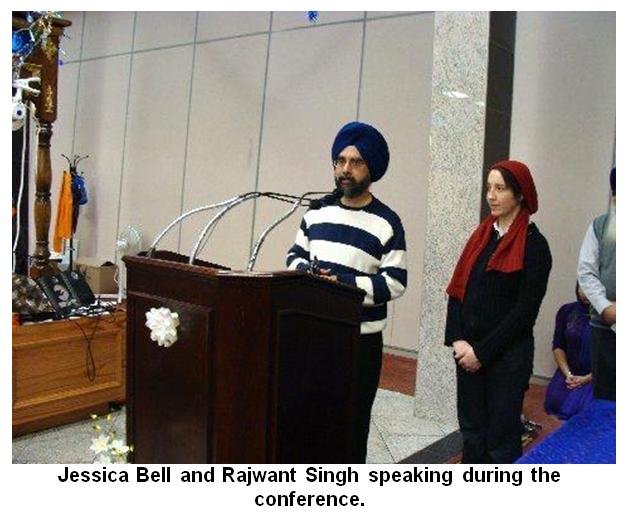 TORONTO—Toronto area Sikh community for the first time had series of events on Climate change and environmental issues through out the weekend in various gurdwaras. Sikh environmentalist activist Baba Sewa Singh from Khadur Sahib, India, was honored during these meetings by the Sikh community for his efforts on behalf of the environment. Climate Action Network, in partnership with Dixie Road Gurdwara and EcoSikh.org had invited Baba Sewa Singh and Dr. Rajwant Singh, Chairman of Sikh Council on Religion and Education and Convener of EcoSikh, to speak in three programs focused on Climate change issues in major Sikh centers in Toronto.
TORONTO—Toronto area Sikh community for the first time had series of events on Climate change and environmental issues through out the weekend in various gurdwaras. Sikh environmentalist activist Baba Sewa Singh from Khadur Sahib, India, was honored during these meetings by the Sikh community for his efforts on behalf of the environment. Climate Action Network, in partnership with Dixie Road Gurdwara and EcoSikh.org had invited Baba Sewa Singh and Dr. Rajwant Singh, Chairman of Sikh Council on Religion and Education and Convener of EcoSikh, to speak in three programs focused on Climate change issues in major Sikh centers in Toronto.
Baba Sewa Singh and Dr. Singh addressed over 500 Sikh youth at Dixie Road Gurdwara in Mississaua and a large gathering in Malton Gurdwara in Mississauga. Final conference was held at the Dixie Road Gurdwara on Sunday which was attended by a large congregation.
These speaking events were to coincide with United Nation’s landmark conference on tackling climate change that opened in Copenhagen on Monday, December 7th, 2009. The meeting will climax on December 18 with more than 100 heads of state or government in attendance. This environmental focused program was first ever to take place in the Sikh community in Toronto.
During the speaking event, spiritual leader Baba Sewa Singh from Khadoor Sahib, Punjab, India, spoke eloquently about the environmental projects he has been working and he is initiating in India. He urged Sikhs to take active role in working against Climate change and environmental degradation. He also appealed to Canadian Sikhs to persuade their relatives in Punjab to show concern for the environment and the earth by planting trees and also to switch to environmentally friendly economic activity. He also cited references from Sikh scriptures and stories from Sikh Gurus to emphasize the message on nature and conservation in the Sikh teachings. He said, “when you plant a tree, you are serving humanity and other living beings for hundreds of years. Tree serves humanity regardless of race, religion and social status. He also made a reference about how much carbon is absorbed back by one tree which is important in light of carbon emissions.
 Dr. Rajwant Singh from EcoSikh spoke on how the Punjabi-Canadian community can solve climate change and other environmental problems locally by greening their Gurdwaras. He said, “we must be on the forefront of this challenging issue and it affects the entire humanity. We must train our youngsters to have the eco-consciousness so become eco-warriors in keeping with the spirit of Sikhism.”
Dr. Rajwant Singh from EcoSikh spoke on how the Punjabi-Canadian community can solve climate change and other environmental problems locally by greening their Gurdwaras. He said, “we must be on the forefront of this challenging issue and it affects the entire humanity. We must train our youngsters to have the eco-consciousness so become eco-warriors in keeping with the spirit of Sikhism.”
Both Dixie Road Gurdwara and Malton Gurdwara honored both Baba Sewa Singh and Dr. Rajwant Singh for their environmental activism.
Established in 2009, EcoSikh was created by the Sikh Council on Religion and Education (SCORE), the Alliance of Religions and Conservation (ARC), and the United Nations Development Programme (UNDP). EcoSikh's purpose is to encourage the worldwide Sikh community to address environmental issues, including climate change.
Jessica Bell from Climate Action Network Canada also spoke about how climate change is affecting India and Canada, Canada's poor record in addressing climate change domestically and internationally, and what people in Canada can do to turn Canada from environmental laggard to leader. She appealed to the Sikh community to actively lobby their elected leaders to do more on this issue and also to persuade Canadian government to help developing nations economically to tackle problems arising from climate change.
 “EcoSikh, a five-year plan crafted by SCORE, envisages the dissemination of environment-related knowledge among the Sikh community in India and abroad to develop environmental activism,” said Dr. Rajwant Singh. “As Sikhs we have a responsibility to revere the environment. A Sikh's life is incomplete if he does not revere Nature. Sikhism teaches us to be environmentally conscious and it is an opportunity for Sikhs to demonstrate to the world that we are ready to translate our beliefs into action."
“EcoSikh, a five-year plan crafted by SCORE, envisages the dissemination of environment-related knowledge among the Sikh community in India and abroad to develop environmental activism,” said Dr. Rajwant Singh. “As Sikhs we have a responsibility to revere the environment. A Sikh's life is incomplete if he does not revere Nature. Sikhism teaches us to be environmentally conscious and it is an opportunity for Sikhs to demonstrate to the world that we are ready to translate our beliefs into action."
South Asia is a region highly vulnerable to climate change. Himalayan glacier melt due to climate change is currently causing mass flooding; and at the current rate of melt the glaciers will be reduced in size by 80% in 30 years. These glaciers provide the drinking and irrigation water to 1/6th of humanity, mainly in South Asia and parts of China
These events with the Sikh community are part of Climate Action Network's larger effort to educate and engage the Indo-Canadian community in swing ridings like North York and Mississauga; these ridings are called "swing" because races in federal elections are tight.
